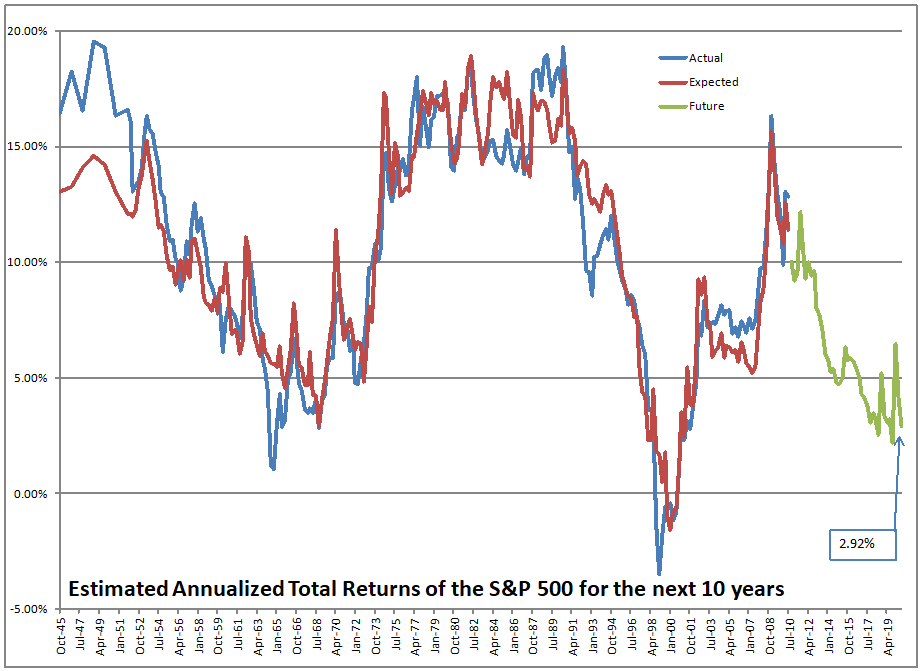Estimating Future Stock Returns, September 2020 Update

Image Credit: Aleph Blog || No, abnormal monetary has many significant costs, not the least of which is an asset bubble that feeds a debt bubble.
Welcome to Wonderland, boys, and girls. At the end of the third quarter, the S&P 500 was priced to return 2.92%/yr for the next ten years, with no adjustment for inflation. You might say, “But David, you’ve reported levels that low in the past, and you were concerned, but you never said ‘Wonderland.'”
True, but the market has rallied further since the end of the quarter, and the level of the S&P 500 now is priced to return 1.79%/yr for the next ten years, with no adjustment for inflation. That’s in the 97th percentile of valuations. Another reason I didn’t say ‘Wonderland’ in the past was that there were a few values in the 1960s that were comparable to valuations. Now the only comparables are from the dot-com bubble. Thus, welcome to Wonderland.
Now, the valuation levels of the Wonderland era lasted for 3 years and 3 months, from the end of the first quarter of 1998 to the end of the second quarter of 2001. It was a period where monetary policy was extremely loose, before tightening enough to send the market into a tailspin, even as many claimed that interest rates have no effect on growth stocks.
Let me post the rest of my graphs, and I will finish my thoughts.

Image Credit: Aleph Blog
Note that we are considerably closer to the maximum valuation levels than to the minimum levels. If we wanted to create a new maximum level, we would have to rally 19.4% from the present levels.

Image Credit: Aleph Blog
Note: this model fits reality a lot more tightly than most models… but it is not a short-run model. It is very accurate for over ten years. My, but this model seems to be forecasting another “lost decade.”

Image Credit: Aleph Blog
There are only seven values from history that compare with present levels. I choose scenarios where the expected return then was within 1%/year of the expected return now. Now, the estimate for where the S&P 500 will be 10 years from now is 3,555, which is lower than today, but given a 2% dividend yield, that still gives a 1.79%/year total return.
But empirically, the seven comparable scenarios give a lower total return of 0.92%/year for the next ten years. Admittedly, this is the “Law of Small Numbers.” (Would that academic finance writers would have that humility when analyzing models that have only twenty years of data, which means their results might just be an anomaly of the short period — which is true of most ESG studies.)
So now that you have had a tour of Wonderland, what should you do? Perhaps you should buy some 10-year single-A corporate bonds. You will likely get more return and your risk will be a lot lower. And who knows? If there is another market crisis, which is likely given abnormal monetary and fiscal policy, with high valuations, you might get a chance to buy stocks a lot lower. The same logic applies to gold or even T-bills.
I’m not saying move everything immediately. After all, there is momentum, so things can go higher still. The odds of getting new highs are highest near new highs. Besides, we haven’t had any significant bankruptcies that weren’t C19-related.
But eventually, the tide will turn. Me? I’ve already lightened up, and have dry powder to buy good companies at moderate prices. As in the dot-com bubble, value investing finally turned after so many threw in the towel. I own companies that make good earnings relative to their prices, and have strong balance sheets. They will prosper better than most through tough scenarios.
They do ring a bell during the topping process. The trouble is that most put in earplugs as a result of the festivities so that they can ignore the naysayers. As such, I say to you, make adjustments before you get scared and wish you had done it earlier.
That’s all for now.
Disclaimer: David Merkel is an investment professional, and like every investment professional, he makes mistakes. David encourages you to do your own independent "due diligence" on ...
more


